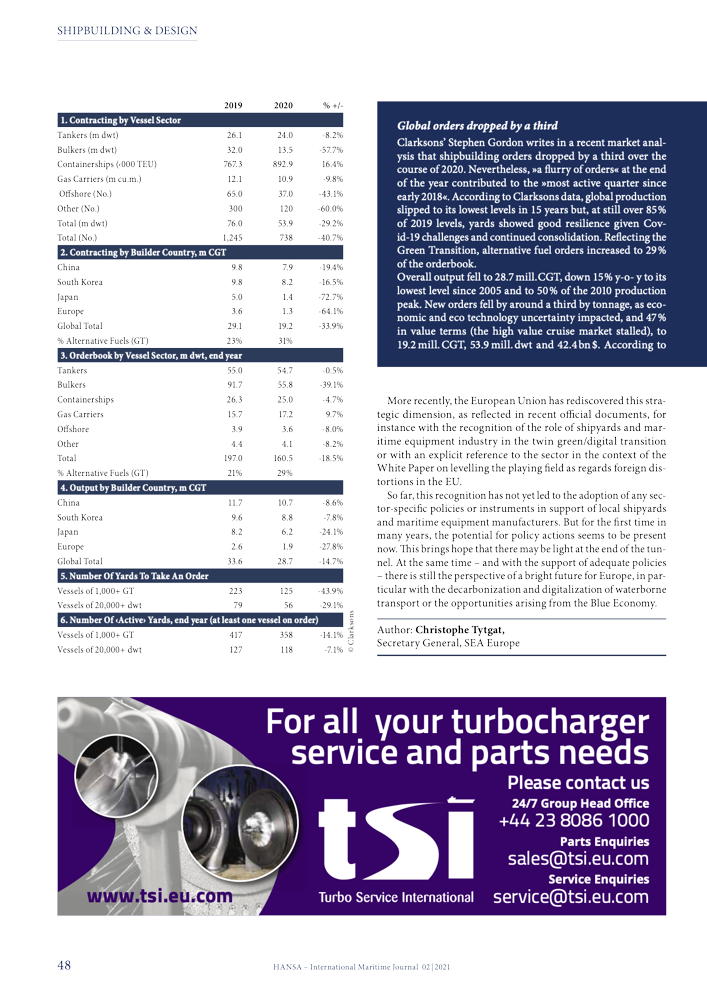2020 was an unprecedented year due to Covid-19. The crisis has hit hard many sectors, also in Europe, not least Europe’s shipyards and maritime equipment industry, known as maritime technology sector
Before Covid-19, Europe’s complex shipbuilding industry was in a better shape than global merchant shipbuilding markets, holding a global[ds_preview] leadership in complex shipbuilding and maritime equipment manufacturing. With Covid-19, however, Europe’s maritime technology sector has been hit much harder than its global competitors. In the first half of 2020, new orders for ships in Europe decreased by 62% in tonnage and 77% in value, compared to 2019. Furthermore, Covid-19 has forced maritime technology companies to reduce or stop their production and to implement costly health and safety measures. Several companies faced liquidity problems or experienced difficulties with foreign workforce not able to return to work due to border closures. Contrary to previous crises, shipowners have also been hit hard this time, especially those operating cruise ships.
Forecasts predict that the full impact of Covid-19 for the maritime technology sector will mostly be felt as of 2021, when new orders for ships will have dried up. The crisis is expected to last until 2023 or even 2024. Hence, many companies will be forced to lay off workforce, reorganize production and adjust capacity, resulting in increased costs and eroded margins and having negative consequences on sectoral know-how and skills. This situation occurs at a time that the sector was also suffering from the severe consequences of massive state aid and other trade protectionism and was coping with the challenges from the twin green/digital transition and the search for new skilled talents.
A strategic sector at risk
Asian maritime technology companies have been able to restart their economic activities earlier than in Europe, giving them a competitive advantage over European companies. This advantage has come on top of the other benefits that Asian companies had already been benefiting from, such as predatory pricing, massive state aid and trade protectionism. In addition to these existing benefits, many Asian companies are now also benefiting from specific Covid-19-related subsidization programmes, to enable them to cope with the consequences from the pandemic crisis.
These (additional) state aid benefits and trade protectionism create huge competitive distortions to the detriment of Europe. Over the past decades, Europe’s shipyards have lost nearly all merchant shipbuilding markets and part of offshore building to Asia and, more recently, their leadership in complex shipbuilding has been challenged too. In addition, Europe’s maritime equipment industry has also been suffering from increased trade protectionism and trade wars. With Covid-19, competitive distortions have further aggravated whilst Europe maintains an “open-market” policy enabling foreign companies to continue to do easy business with or in Europe.
Without any fast actions, there is a serious risk that Europe may lose the remainder of its strategic maritime technology sector to Asia. Under such worst-case scenario, Europe would become entirely dependent on Asia’s shipyards and maritime equipment industry for the building or retrofitting of (complex) ships or for the production and supply of maritime systems, equipment and technologies, able to guarantee Europe’s security, defence, access to seas, trades and Blue Economy, and to implement EU policies, including the »European Green Deal«.
However, Covid-19 has taught Europe that there are big risks in being – or becoming – too dependent on foreign nations. This is also valid for the maritime technology sector, where a loss of this strategic sector to Asia would also mean a loss of Europe’s status as global maritime power and a loss of Europe’s global leadership in complex shipbuilding and (advanced) maritime equipment manufacturing. Such loss would have serious geo-political repercussions for Europe as well as adverse economic and social consequences, especially for Europe’s maritime regions.
The time for EU action is now
Instead of taking the risk to lose the remainder of its strategic maritime technology industry to Asia, Europe should take adequate political actions in support of its local maritime technology sector and invest in its naval and maritime capabilities. For these reasons, SEA Europe has called upon the European Commission to recognize the strategic dimension of the maritime technology sector and to adopt sectoral measures as opposed to »horizontal policies« that apply to any manufacturing industry regardless of an industry’s specific needs and challenges. Interestingly, the need for such approach was already recognised in October 2017, in a study conducted for the European Commission.
Light at the end of the tunnel?
For several years, the European Union had forgotten about the strategic dimension of the maritime technology sector and had failed to adopt adequate policies in support of the sector. This lack of political attention contributed to the loss of too many markets to Asia.
More recently, the European Union has rediscovered this strategic dimension, as reflected in recent official documents, for instance with the recognition of the role of shipyards and maritime equipment industry in the twin green/digital transition or with an explicit reference to the sector in the context of the White Paper on levelling the playing field as regards foreign distortions in the EU.
So far, this recognition has not yet led to the adoption of any sector-specific policies or instruments in support of local shipyards and maritime equipment manufacturers. But for the first time in many years, the potential for policy actions seems to be present now. This brings hope that there may be light at the end of the tunnel. At the same time – and with the support of adequate policies – there is still the perspective of a bright future for Europe, in particular with the decarbonization and digitalization of waterborne transport or the opportunities arising from the Blue Economy.
Christophe Tytgat, Secretary General, SEA Europe
















